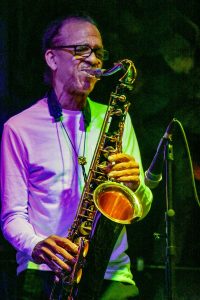
Horn players are often to jazz and fusion what guitarists are to popular music — attention-grabbing players who wait for their chance to speak through soloing rather than listening to their ensemble’s overall sound.
Yet there are significant differences. Guitarists play chordal instruments, so there are far fewer lulls in their playing because they also have rhythmic duties. Horn players, on the other hand, are often required not to play through the bulk of most pieces of music. Until, that is, they combine with other horn section members to create chords, or to dazzle listeners with their single-note solos. And many look bored during live performances, appearing to stand around waiting for those spotlight opportunities.
Carle Wayne Vickers, who died April 6 after a battle with cancer at the age of 76, was decidedly not one of them.
Born on September 5, 1947, in Portland, Ore., the multi-wind instrumentalist’s most recent performances during a historic, underpublicized career were with T’s Express, the two-year-old jazz/fusion salute to the music of visionary keyboardists Chick Corea (1941-2021) and Herbie Hancock. Formed by West Palm Beach-based drummer Tim Moss (www.facebook.com/timothy.moss.56), the quintet has been reduced to a quartet by Vickers’ absence, and performs May 19 at Brewhouse Gallery in Lake Park and May 20 at Northwood Art & Music Warehouse in West Palm Beach.
“I knew Carle was having health issues,” Moss says, “but I didn’t know how bad they were. He’d taken a couple months off to address them. I found out after the fact that he was in hospice treatment. He’d kept it a private matter. We’d celebrated his birthday not long ago, and I couldn’t believe he’d turned 76. We’re devastated.”
Vickers was raised in West Palm Beach after moving to South Florida with his family as a child. And when he was on stage with T’s Express while he wasn’t playing, he animatedly moved and intently listened to, vibed with, and saluted the work of bandmates Moss, keyboardist Tom Wierzbicki, guitarist Adam Douglass, bassist Burt Boice and his predecessor, Mike Schweisthal.
“Carle was a beautiful cat, a monster player, and an incredibly knowledgeable musician,” says Douglass.
There were many reasons for Vickers’ dexterity, humility, studiousness and in-the-moment appreciation for his co-workers, attributes many other musicians fail to learn. Over the course of his 50-year career, the multi-instrumentalist and producer — who played alto, tenor and soprano saxophones, flute, trumpet, and flugelhorn — traversed multiple musical styles and toured the world with a variety of acclaimed artists.
He was in pre-med studies when he became part of the Greensboro, N.C.-formed Fantastic Soul Men Orchestra. The 15-piece ensemble often backed the famed vocal duo Sam & Dave (singers of the seminal R&B hit “Soul Man”). After relocating to New York City and then Los Angeles, the group reformed around its horn section to become the sophisticated funk act L.T.D. That downsized act reached star status by releasing three consecutive gold and platinum albums on A&M Records in the late 1970s, and had a Top 10 hit single in 1977 with “(Every Time I Turn Around) Back in Love Again.”
“That song was infectious,” Moss says. “Carle and I fell into the groove to that one all the time when we rehearsed or sound-checked.”
L.T.D. featured a young vocalist named Jeffrey Osborne, who would later chart a successful solo career, but the band continued to work through the 1990s. Vickers’ recording, production and touring credits also included blues artist Little Milton, soul singer Solomon Burke, and rapper LL Cool J. Yet he still returned west to grad school before the turn of the century, studying jazz performance and composition at the University of California in Irvine. He returned south afterward, first to Georgia and then South Florida.

“Carle had a deep knowledge of music history across multiple genres,” says Schweisthal, who played with T’s Express from the summer of 2022 through January of this year. “He was heavily into the theoretical aspect of music, not just performing and listening. He had a lifetime of experience and a wealth of information to share.”
In T’s Express, Vickers primarily played alto, tenor and soprano saxes and flute on challenging compositions by Corea (like “Spain,” “500 Miles High,” “Blue Miles”) and Hancock (“Watermelon Man,” “Cantaloupe Island,” “Hang Up Your Hang Ups”). And his contributions linked the band’s simpatico rhythm section with the mercurial playing of the Berklee College of Music-educated Douglass and classically trained Wierzbicki, who continues to capably handle the parts of Corea and Hancock, two of the greatest keyboardists and composers in recorded music history.
At the emotional first show back by T’s Express after the announcement of Vickers’ death, on April 21 at the Brewhouse Gallery, quartet members Moss, Boice, Wierzbicki and Douglass augmented their playing and the band’s song list to compensate for his absence. Moss surfed through the militaristic attacks of fusion drum titan Billy Cobham on his challenging tune “Stratus”; Boice added iconic bassist Stanley Clarke’s title track to his album “School Days” at the end of his unaccompanied improvisational solo, coaxing Moss to join him.
As for Wierzbicki and Douglass, both are as adept at listening and accompaniment as they are at soloing. The keyboardist’s Hancock-like chording, funk feel and array of sounds — from acoustic and electric pianos to clavinet, organ and synthesizer — often literally set the tone for the band. And Douglass especially shines when covering material by the late Corea, whose various lineups included guitarists like Bill Connors, Al Di Meola, Scott Henderson, and Frank Gambale.
Each member of T’s Express played honorably in saluting Vickers, who was pictured smiling in the middle of a band photo on the screen above the Brewhouse Gallery stage. “(Every Time I Turn Around) Back in Love Again” played over the club’s PA system after the band’s performance as a final tribute.
Guests from horn players to percussionists have joined the group since Vickers’ health crisis started, but Moss isn’t hurrying to replace what he saw as an invaluable cog in his musical wheel.
“After shows, Carle would call me,” says Moss. “He wanted to talk about how the performances on each song had gone, partly because he thought these jazz tunes were ahead of him. He thought of himself as a soul player, and I’d tell him, ‘Dude, this stuff is not easy. You’re doing a hell of a job.’ And he was, but he was also such a humble guy. We’d spend an hour on the phone after every show. I’ll certainly miss playing with him, but I’ll really miss those conversations too.”
If You Go
T’s Express performs from 6-9 p.m. May 19 at Brewhouse Gallery, 720 Park Ave., Lake Park, and from 7-10 p.m. May 20 at Northwood Art & Music Warehouse, 933 28th St., West Palm Beach.
Info: 561-425-9040, northwoodartandmusic.com, 561-469-8930, brewhousegallery.com